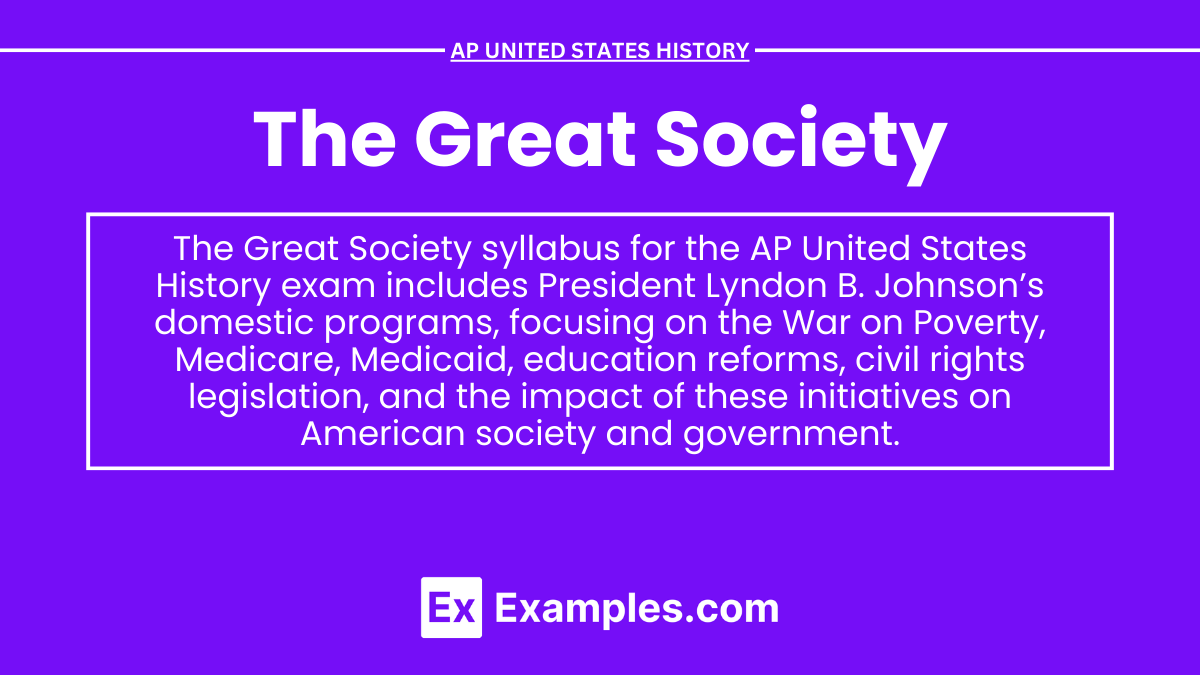In AP United States History, the Great Society is studied as a transformative set of domestic programs introduced by President Lyndon B. Johnson in the 1960s. Aimed at eliminating poverty and racial injustice, the Great Society expanded the federal government’s role in education, healthcare, and civil rights. It led to significant legislation, including Medicare, Medicaid, the Civil Rights Act, and the Voting Rights Act, which had lasting impacts on American society. The programs reflect the era’s broader social and political movements and continue to influence U.S. policy today.
Learning Objectives
In AP United States History, you will be expected to understand the goals and key components of the Great Society, including efforts to combat poverty, expand civil rights, and improve access to education and healthcare. The impact of programs like Medicare, Medicaid, and the Civil Rights Act on American society will be analyzed. You will also examine the criticisms and challenges faced by the Great Society, as well as its lasting legacy in shaping modern social welfare and civil rights policies.
Key Programs and Policies
War on Poverty
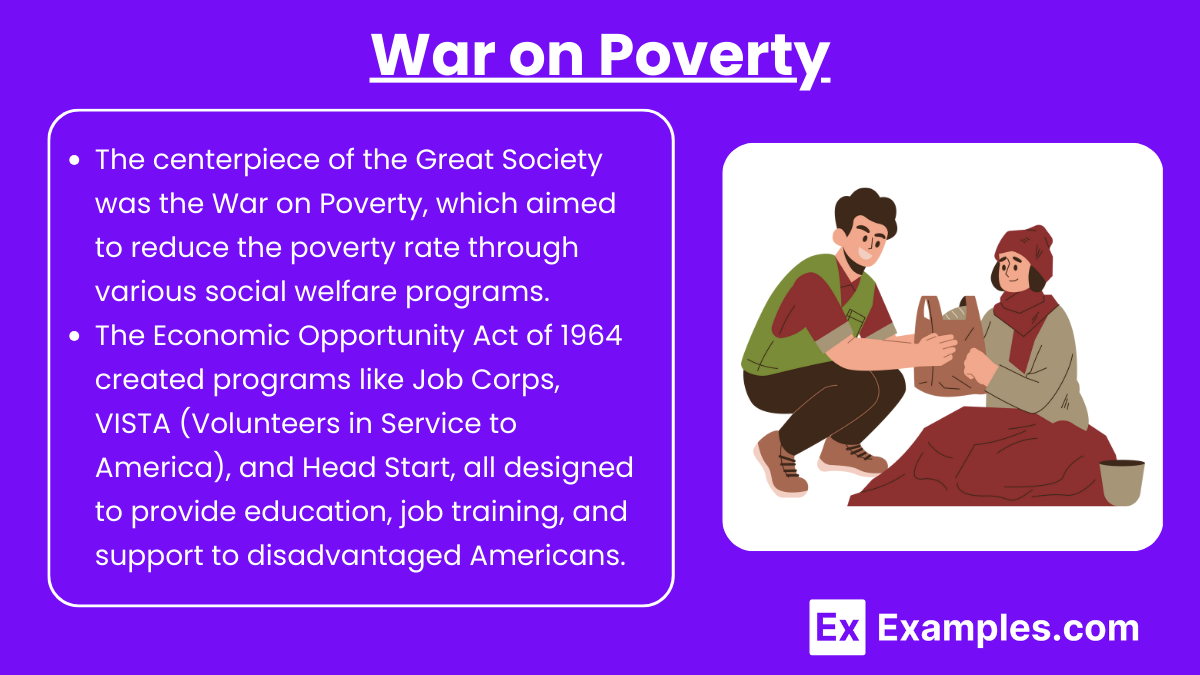
- The centerpiece of the Great Society was the War on Poverty, which aimed to reduce the poverty rate through various social welfare programs.
- The Economic Opportunity Act of 1964 created programs like Job Corps, VISTA (Volunteers in Service to America), and Head Start, all designed to provide education, job training, and support to disadvantaged Americans.
Education Initiatives
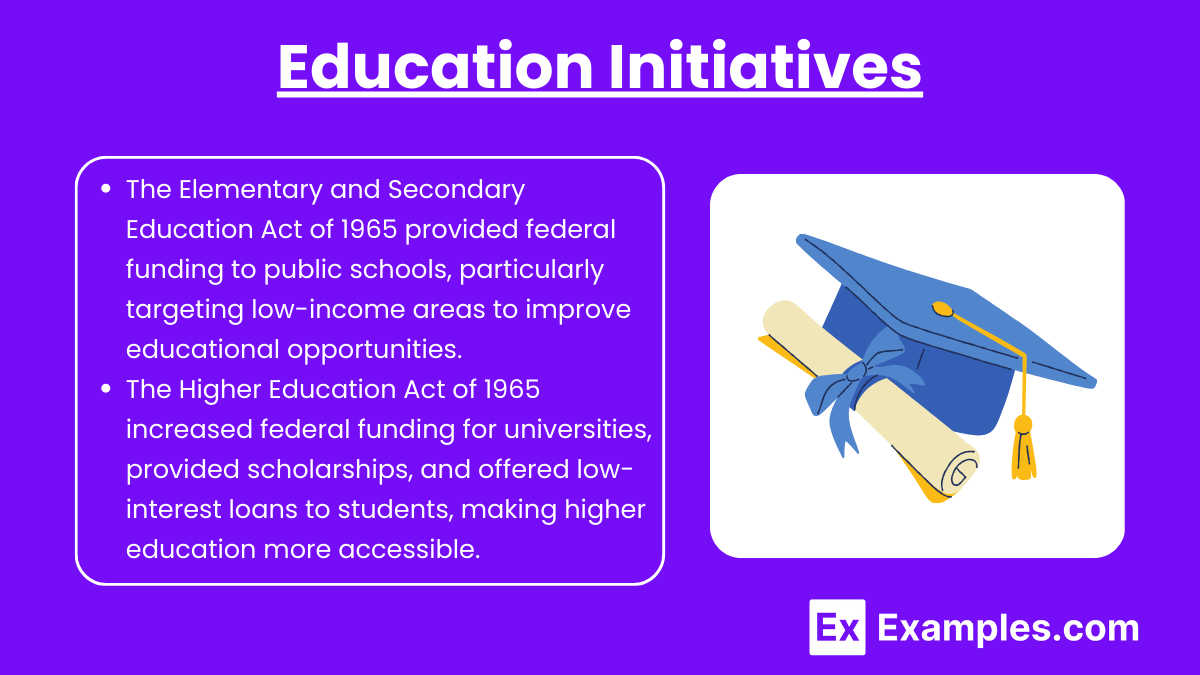
- The Elementary and Secondary Education Act of 1965 provided federal funding to public schools, particularly targeting low-income areas to improve educational opportunities.
- The Higher Education Act of 1965 increased federal funding for universities, provided scholarships, and offered low-interest loans to students, making higher education more accessible.
Healthcare Reforms
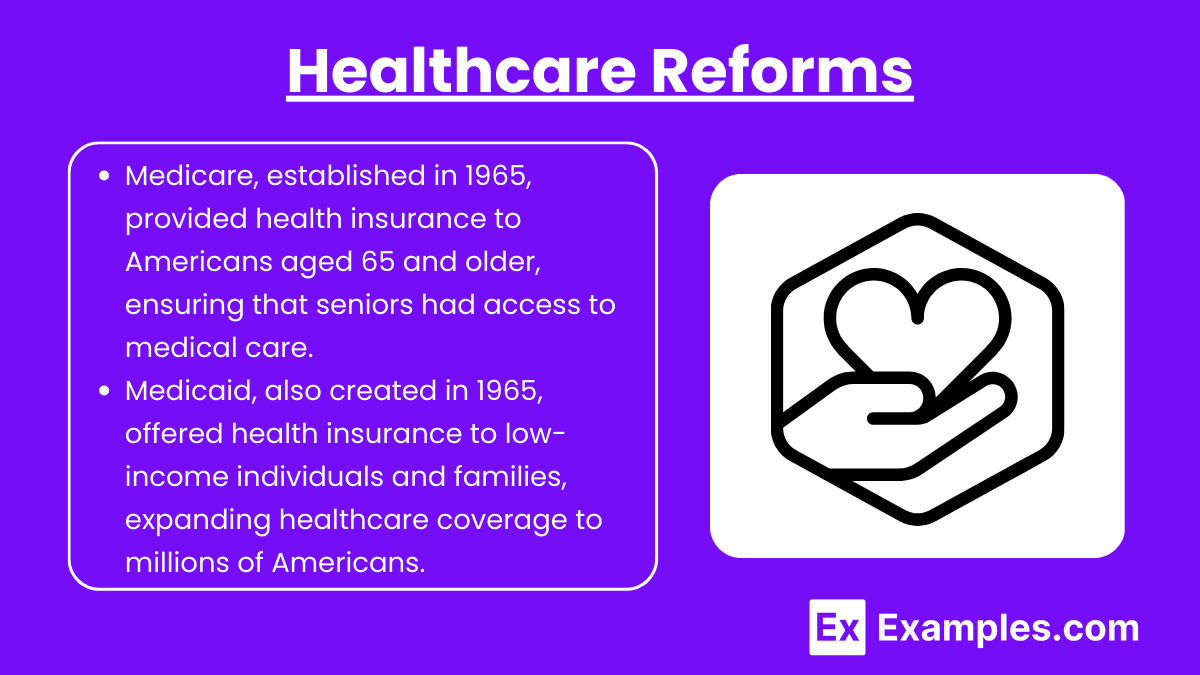
- Medicare, established in 1965, provided health insurance to Americans aged 65 and older, ensuring that seniors had access to medical care.
- Medicaid, also created in 1965, offered health insurance to low-income individuals and families, expanding healthcare coverage to millions of Americans.
Civil Rights Legislation
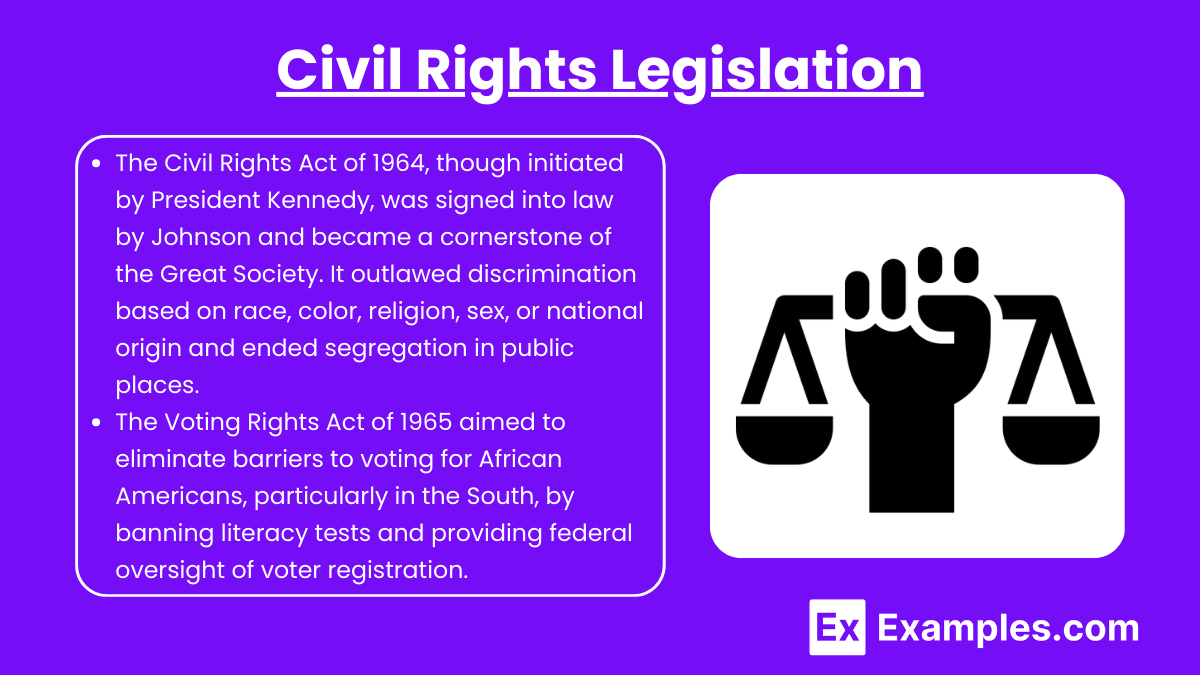
- The Civil Rights Act of 1964, though initiated by President Kennedy, was signed into law by Johnson and became a cornerstone of the Great Society. It outlawed discrimination based on race, color, religion, sex, or national origin and ended segregation in public places.
- The Voting Rights Act of 1965 aimed to eliminate barriers to voting for African Americans, particularly in the South, by banning literacy tests and providing federal oversight of voter registration.
Environmental and Cultural Programs
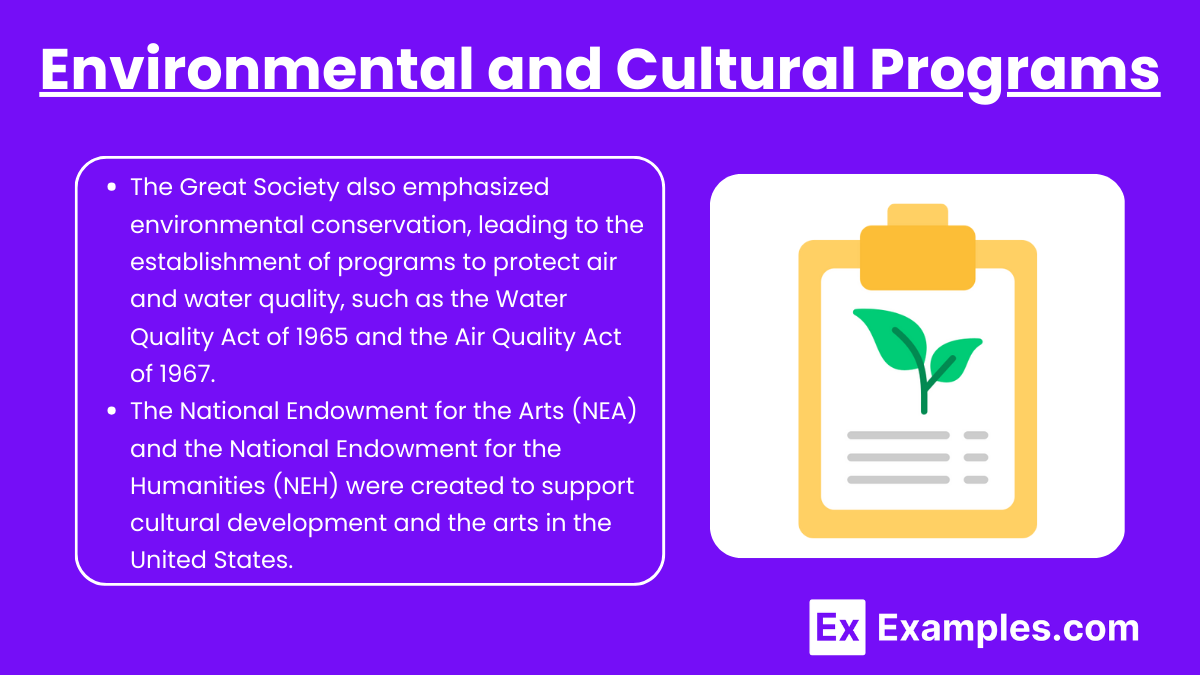
- The Great Society also emphasized environmental conservation, leading to the establishment of programs to protect air and water quality, such as the Water Quality Act of 1965 and the Air Quality Act of 1967.
- The National Endowment for the Arts (NEA) and the National Endowment for the Humanities (NEH) were created to support cultural development and the arts in the United States.
Impact and Legacy
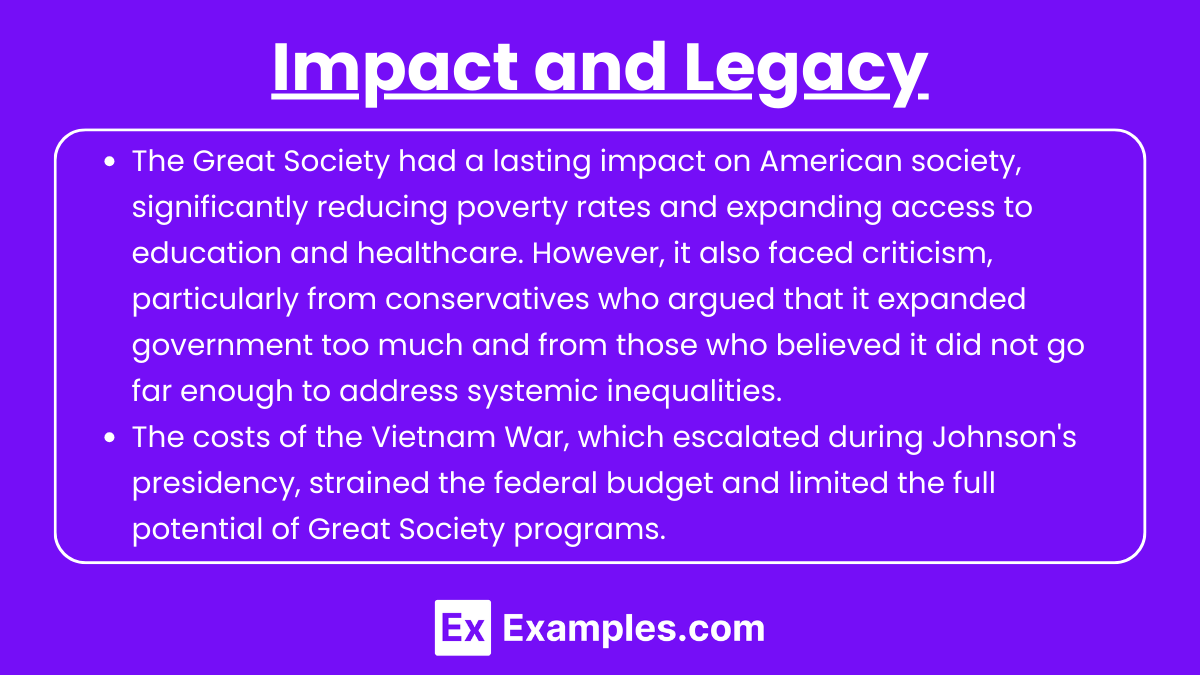
- The Great Society had a lasting impact on American society, significantly reducing poverty rates and expanding access to education and healthcare. However, it also faced criticism, particularly from conservatives who argued that it expanded government too much and from those who believed it did not go far enough to address systemic inequalities.
- The costs of the Vietnam War, which escalated during Johnson’s presidency, strained the federal budget and limited the full potential of Great Society programs.
Examples
Example 1: Economic Opportunity Act (1964)
The Economic Opportunity Act created several key programs, such as Job Corps and Head Start, to address poverty through education and job training.
Example 2: Medicare (1965)
Medicare provided health insurance for Americans aged 65 and older, significantly improving healthcare access for seniors.
Example 3: Civil Rights Act (1964)
The Civil Rights Act outlawed segregation and discrimination, becoming a landmark achievement in the fight for racial equality in the U.S.
Example 4: Elementary and Secondary Education Act (1965)
This act provided federal funding to public schools, particularly benefiting low-income districts and improving educational opportunities nationwide.
Example 5: Voting Rights Act (1965)
The Voting Rights Act eliminated barriers to voting for African Americans, leading to a significant increase in voter registration and participation in the South.
MCQs
1. Which program was created under the Great Society to provide health insurance to Americans aged 65 and older?
- A) Medicaid
- B) Social Security
- C) Medicare
- D) Head Start
Explanation: Medicare, established in 1965, was a Great Society program that provided health insurance to Americans aged 65 and older, ensuring access to medical care for seniors.
2. What was the primary goal of the Economic Opportunity Act of 1964?
- A) To reduce racial discrimination
- B) To provide healthcare to low-income individuals
- C) To combat poverty through education and job training programs
- D) To improve environmental protection
Explanation: The Economic Opportunity Act of 1964 aimed to reduce poverty by creating programs like Job Corps and Head Start, which focused on education and job training for disadvantaged Americans.
3. Which Great Society law aimed to eliminate barriers to voting for African Americans?
- A) Civil Rights Act of 1964
- B) Voting Rights Act of 1965
- C) Fair Housing Act of 1968
- D) Higher Education Act of 1965
Explanation: The Voting Rights Act of 1965 sought to eliminate barriers to voting for African Americans, particularly in the South, by banning literacy tests and providing federal oversight of voter registration.

